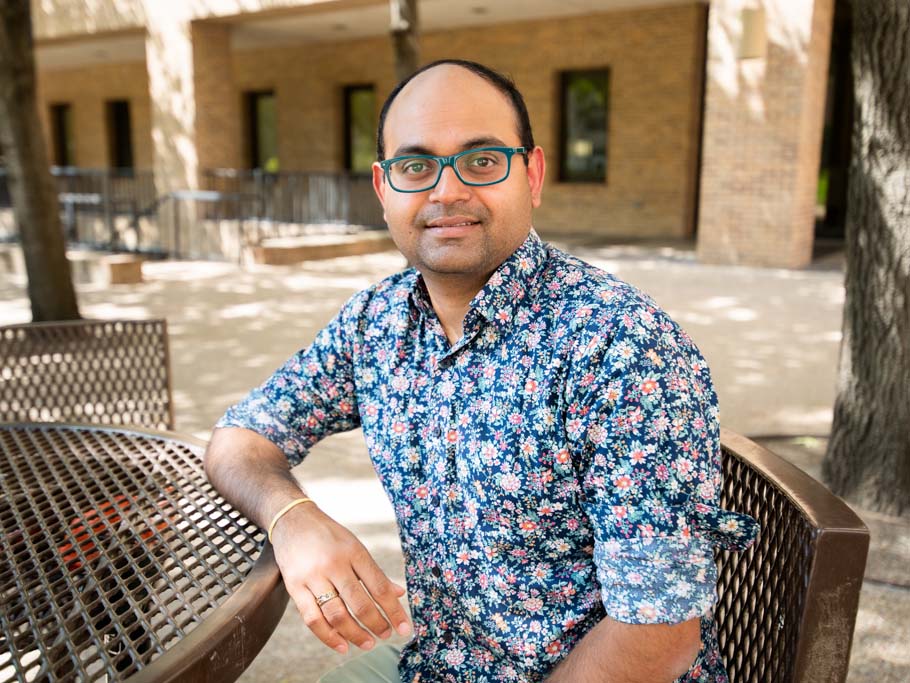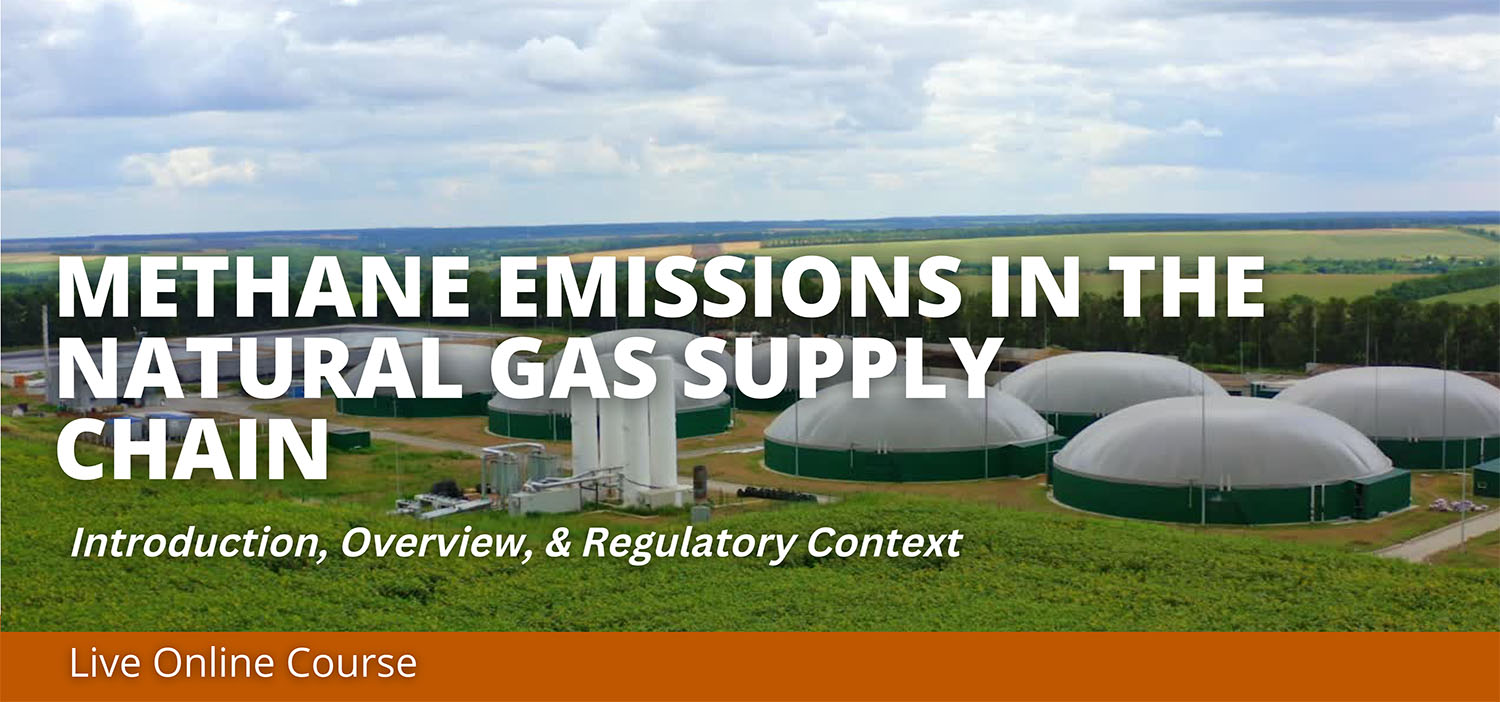TBD
10 a.m. – 12 p.m. CT (4 hours total)
David Allen, Ph.D., lead instructor
Synchronous, online via Zoom. Recordings provided.
$450 (group discounts available)
Credentials: .40 CEUs; Cockrell School of Engineering course certificate and digital badge
Methane is one of the most potent greenhouse gases contributing to climate change, while at the same time, a leading energy source. More knowledge will lead to more solutions. This course covers best practices in how to manage and optimize methane. It is led by distinguished University of Texas at Austin energy experts Professor David Allen, Ph.D. and Professor Arvind Ravikumar, Ph.D.
| Dates | Time | Location | Price | |
|---|
| TBD |
10am – 12 pm CT |
Synchronous Online |
$450 |
Registration is closed. |
For group discounts and special government, military and non-profit rates, please contact This email address is being protected from spambots. You need JavaScript enabled to view it..
Course Topics
- History, uses and opportunities of natural gas supply chains in global energy systems
- Scientific basis for methane as a greenhouse gas and effects of its rapid development
- Sources of methane emissions in natural gas supply chain
- Regulatory, equity, and economic drivers for reducing methane emissions, including coverage of Inflation Reduction Act impacts
- Role of economics, climate and security trade-offs
 David Allen, Ph.D., is the Gertz Regents Professor of Chemical Engineering, and the Director of the Center for Energy and Environmental Resources, at the University of Texas at Austin. Allen has been a lead investigator for studies that made some of the first measurements of methane emissions from unconventional oil and gas production.
David Allen, Ph.D., is the Gertz Regents Professor of Chemical Engineering, and the Director of the Center for Energy and Environmental Resources, at the University of Texas at Austin. Allen has been a lead investigator for studies that made some of the first measurements of methane emissions from unconventional oil and gas production.
Allen has served on a variety of governmental advisory panels and from 2012 to 2015 chaired the U.S. Environmental Protection Agency’s Science Advisory Board. In 2017, Allen was elected to the US National Academy of Engineering and in 2020 he received the ENI Energy Transitions Award. Allen has been recognized with teaching awards from the University of Texas, UCLA, and the American Institute of Chemical Engineer’s national award for chemical engineering education.
Allen has developed textbooks and environmental educational materials for engineering curricula and for the University of Texas at Austin’s core curriculum, as well as engineering education materials for high school students. He led the development of a year-long high school engineering course, Engineer Your World, which is used in hundreds of high schools nationwide. Allen received his B.S. degree in Chemical Engineering from Cornell University in 1979. He earned his M.S. and Ph.D. degrees in Chemical Engineering from California Institute of Technology in 1981 and 1983.
More about David Allen

Arvind Ravikumar, Ph.D.
Dr. Ravikumar’s research group, the Sustainable Energy Development Lab, focuses on developing technical, social and policy solutions to effective climate action in the global energy sector through a combination of field work, model development and scenario analysis. Specific topics include the role of new technologies in decarbonizing the oil and gas industry, methane emissions and the future of LNG and natural gas, equitable energy transitions in extractive economies, and energy demand and sustainability in the developing world. He is also co-director of the Energy Emissions Modeling and Data Lab.
More about Arvind Ravikumar
- Managers and mid-level executives in the energy industry who want to deepen and broaden their knowledge
- Professionals in coal, oil, or gas who wish to expand into clean energy topics
- Professionals in other sectors such as finance, consulting, human resources, etc. who want to know more about the energy sector
- Members of environmental organizations
- Environment and energy public policy officials at all levels
TxEEE now issues digital badges that can be used to show that you have completed a course with us. This badge is secure verification that you can share on social media or with anyone of your choosing. These badges can also be printed as a traditional certificate.
Upon completion of this course, you will receive a digital badge and rewarded .40 Continuing Education Units (CEUs). Attendees must attend the entire professional development course to earn this badge and receive CEUs.
A variety of factors are driving increased regulatory and investment attention on energy sector methane emissions:
- new technologies are making remote sensing of methane emissions possible anywhere in the world;
- better understanding of the emission sources are enabling low cost mitigations;
- new regulations and international agreements to limit methane emissions are emerging;
- ESG investors are demanding smaller environmental footprints; and consumers are demanding emissions labeling and certification for natural gas supply chains.
This email address is being protected from spambots. You need JavaScript enabled to view it.


 David Allen, Ph.D., is the Gertz Regents Professor of Chemical Engineering, and the Director of the Center for Energy and Environmental Resources, at the University of Texas at Austin. Allen has been a lead investigator for studies that made some of the first measurements of methane emissions from unconventional oil and gas production.
David Allen, Ph.D., is the Gertz Regents Professor of Chemical Engineering, and the Director of the Center for Energy and Environmental Resources, at the University of Texas at Austin. Allen has been a lead investigator for studies that made some of the first measurements of methane emissions from unconventional oil and gas production.




